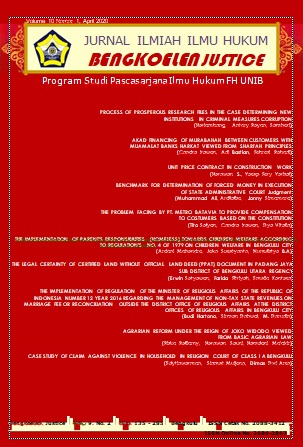Main Article Content
Abstract
The purpose of this research is to study about Benchmark Determination of the Administrative Court Decision Execution Forced In. Research methods used in this thesis is a research type normative and descriptive analytical research specifications, and approaches used, namely, the approach Law and approach cases. From the research we concluded that since when the claimant may apply for money of enforced at the time of the initial filing a lawsuit to the Administrative Court, for their money forced / Dwangsom in a decision of the State Administrative Court, it is motivated by a petition of Plaintiff in the lawsuit to beg loading money forced / Dwangsom Defendant if lost and wayward implement administrative court ruling, benchmark application is the amount of money forced the ruling stating Plaintiff granted, judgment and decision condemnatoir who has obtained permanent legal force. Because implementing administrative court ruling is always Agency / Administrative Officers are still active, more effective and efficient if the imposition of forced currency / dwangsom taken / deducted from salaries / allowances officials concerned each month. So it is not charged to the State finances forced money order imposing sanctions / dwangsom and administratively feasible, must be followed by concrete implementing regulations relating to money forced / dwangsom to sync with the Administrative Court Act and the Law on Government Administration.
Keywords
Article Details
References
- Books
- Buku II Tentang Pedoman Teknis Administrasi dan Teknis Peradilan Tata Usaha Negara, Edisi 2009, Mahkamah Agung.
- Bahder Johan Nasution. 2011.Negara Hukum dan Hak Asasi Manusia.Cet. I. CV. Mandar Maju, Bandung.
- Harifin A. Tumpa. 2010. Memahami Eksistensi Uang Paksa(Dwangsom) dan Implementasinya di Indonesia. Edisi Pertama. Cet. 1.Kencana, Jakarta.
- Indroharto. 1993. Usaha Memahami Undang-Undang Tentang Peradilan Tata Usaha Negara, Buku II Beberapa Pengertian Dasar Hukum Tata Usaha Negara. Ed. Rev. Cet. 4. Pustaka Sinar Harapan, Jakarta.
- Lilik Mulyadi. 2009. Tuntutan Uang Paksa (Dwangsom/Astreinte) dalam Perkara Perdata Menurut Teori dan Praktik. Cet. Pertama. Bayumedia Publishing, Malang.
- R. Wiyono. 2013. Hukum Acara Peradilan Tata Usaha Negar.Edisi Ketiga. Sinar Grafika,Jakarta.
- Sudikno Mertokusumo. 2007.Mengenal Hukum Suatu Pengantar, Edisi Kelima. Liberty, Yogyakarta.
- Supandi. 2011.Hukum Peradilan Tata Usaha Negara (Kepatuhan Hukum Pejabat Dalam Mentaati Putusan Pengadilan Tata Usaha Negara). Pustaka Bangsa Press, Medan.
- Wiryono Projodikoro. 1977. Asas-asas Hukum Tata Negara Di Indonesia. Dian Rakyat, Jakarta.
- Seminar / Discussion Paper.
- Supandi. 2004. Problematika Penetapan Eksekusi Putusan Peradilan TUN Terhadap Pejabat TUN Daerah, makalah disampaikan pada Workshop yang diselenggarakan oleh LPP-HAN bekerjasama dengan Komisi Hukum Nasional RI, 28 Agustus 2004, di Jakarta. hal. 1., dalam Supandi, Hukum Peradilan Tata Usaha Negara (Kepatuhan Hukum Pejabat Dalam Mentaati Putusan Pengadilan Tata Usaha Negara).Pustaka Bangsa Press. Medan. 2011.
- Website
- http://antiquem.blogspot.co.id/2011/11/hambatan-eksekusi-putusan-ptun.html, tanggal 11 Pebruari 2016, Jam 12.17 WIB.
- Regulation
- Republik Indonesia, Undang-Undang Dasar 1945 (Amandemen Ke empat).
- Republik Indonesia, Undang-Undang Nomor 5 Tahun 1986 tentang Peradilan Tata Usaha Negara.
- Republik Indonesia, Undang-Undang Nomor 22 Tahun 1999 tentang Pemerintahan Daerah.
- Republik Indonesia, Undang-Undang Nomor 28 Tahun 1999 tentang Penyelenggaraan Negara yang Bersih dan Bebas dari Korupsi, Kolusi dan Nepotisme.
- Republik Indonesia, Undang-Undang Nomor 9 Tahun 2004 tentang Perubahan atas Undang-Undang Nomor 5 Tahun 1986 tentang Peradilan Tata Usaha Negara.
- Republik Indonesia, Undang-Undang Nomor 32 Tahun 2004 tentang Pemerintahan Daerah.
- Republik Indonesia, Undang-Undang Nomor 48 Tahun 2009 tentang Kekuasaan Kehakiman.
- Republik Indonesia, Undang-Undang Nomor 51 Tahun 2009 tentang Perubahan Kedua atas Undang-Undang Nomor 5 Tahun 1986 tentang Peradilan Tata Usaha Negara.
- Republik Indonesia, Undang-Undang Nomor 30 Tahun 2014 tentang Administrasi Pemerintahan.
References
Books
Buku II Tentang Pedoman Teknis Administrasi dan Teknis Peradilan Tata Usaha Negara, Edisi 2009, Mahkamah Agung.
Bahder Johan Nasution. 2011.Negara Hukum dan Hak Asasi Manusia.Cet. I. CV. Mandar Maju, Bandung.
Harifin A. Tumpa. 2010. Memahami Eksistensi Uang Paksa(Dwangsom) dan Implementasinya di Indonesia. Edisi Pertama. Cet. 1.Kencana, Jakarta.
Indroharto. 1993. Usaha Memahami Undang-Undang Tentang Peradilan Tata Usaha Negara, Buku II Beberapa Pengertian Dasar Hukum Tata Usaha Negara. Ed. Rev. Cet. 4. Pustaka Sinar Harapan, Jakarta.
Lilik Mulyadi. 2009. Tuntutan Uang Paksa (Dwangsom/Astreinte) dalam Perkara Perdata Menurut Teori dan Praktik. Cet. Pertama. Bayumedia Publishing, Malang.
R. Wiyono. 2013. Hukum Acara Peradilan Tata Usaha Negar.Edisi Ketiga. Sinar Grafika,Jakarta.
Sudikno Mertokusumo. 2007.Mengenal Hukum Suatu Pengantar, Edisi Kelima. Liberty, Yogyakarta.
Supandi. 2011.Hukum Peradilan Tata Usaha Negara (Kepatuhan Hukum Pejabat Dalam Mentaati Putusan Pengadilan Tata Usaha Negara). Pustaka Bangsa Press, Medan.
Wiryono Projodikoro. 1977. Asas-asas Hukum Tata Negara Di Indonesia. Dian Rakyat, Jakarta.
Seminar / Discussion Paper.
Supandi. 2004. Problematika Penetapan Eksekusi Putusan Peradilan TUN Terhadap Pejabat TUN Daerah, makalah disampaikan pada Workshop yang diselenggarakan oleh LPP-HAN bekerjasama dengan Komisi Hukum Nasional RI, 28 Agustus 2004, di Jakarta. hal. 1., dalam Supandi, Hukum Peradilan Tata Usaha Negara (Kepatuhan Hukum Pejabat Dalam Mentaati Putusan Pengadilan Tata Usaha Negara).Pustaka Bangsa Press. Medan. 2011.
Website
http://antiquem.blogspot.co.id/2011/11/hambatan-eksekusi-putusan-ptun.html, tanggal 11 Pebruari 2016, Jam 12.17 WIB.
Regulation
Republik Indonesia, Undang-Undang Dasar 1945 (Amandemen Ke empat).
Republik Indonesia, Undang-Undang Nomor 5 Tahun 1986 tentang Peradilan Tata Usaha Negara.
Republik Indonesia, Undang-Undang Nomor 22 Tahun 1999 tentang Pemerintahan Daerah.
Republik Indonesia, Undang-Undang Nomor 28 Tahun 1999 tentang Penyelenggaraan Negara yang Bersih dan Bebas dari Korupsi, Kolusi dan Nepotisme.
Republik Indonesia, Undang-Undang Nomor 9 Tahun 2004 tentang Perubahan atas Undang-Undang Nomor 5 Tahun 1986 tentang Peradilan Tata Usaha Negara.
Republik Indonesia, Undang-Undang Nomor 32 Tahun 2004 tentang Pemerintahan Daerah.
Republik Indonesia, Undang-Undang Nomor 48 Tahun 2009 tentang Kekuasaan Kehakiman.
Republik Indonesia, Undang-Undang Nomor 51 Tahun 2009 tentang Perubahan Kedua atas Undang-Undang Nomor 5 Tahun 1986 tentang Peradilan Tata Usaha Negara.
Republik Indonesia, Undang-Undang Nomor 30 Tahun 2014 tentang Administrasi Pemerintahan.

